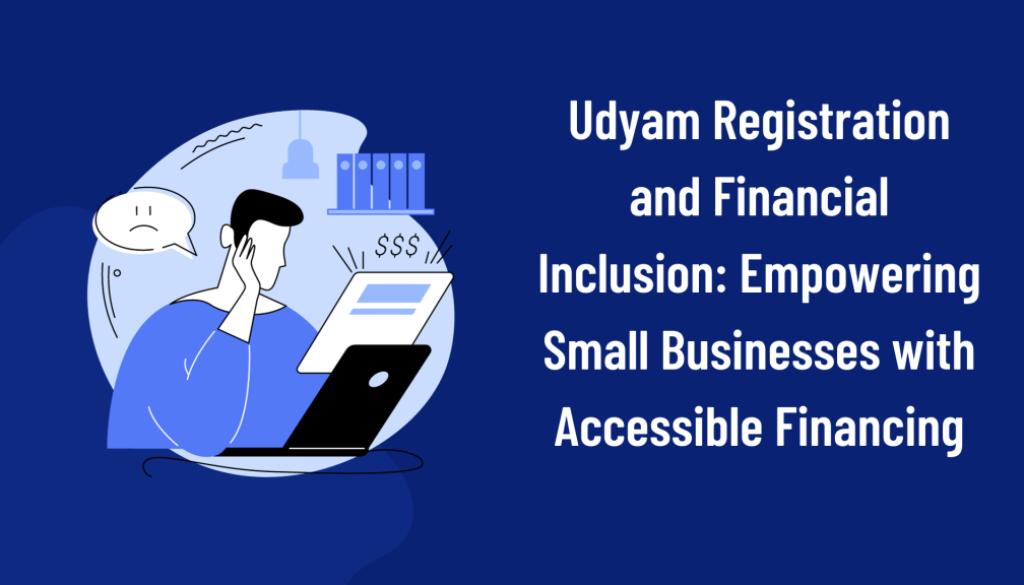Udyam Registration and Financial Inclusion: Empowering Small Businesses with Accessible Financing
In recent years, the landscape of small businesses in India has undergone a significant transformation, with the government’s initiatives playing a pivotal role. One such game-changing initiative is the Udyam Online Registration, a simplified online process introduced by the Ministry of Micro, Small, and Medium Enterprises (MSME) in 2020. This initiative not only formalizes small businesses but also empowers them by providing access to various benefits, including accessible financing. This article explores the impact of Udyam Registration on financial inclusion, elucidating how it has become a catalyst in empowering small businesses with much-needed access to finance.
Financial Inclusion through Udyam Registration:
Udyam Registration has acted as a gateway for small businesses to enter the formal sector, enabling them to avail of financial services that were previously inaccessible. By registering under the Udyam portal, businesses are now eligible for numerous government schemes, subsidies, and loans. Financial institutions are more willing to lend to registered businesses due to the reduced risk associated with formalized enterprises. This newfound recognition has also paved the way for easier credit approvals and lower interest rates, making it financially viable for small businesses to invest in their growth and expansion.
Empowering Entrepreneurs:
Financial inclusion is not just about providing access to credit; it’s about empowering entrepreneurs with financial knowledge and tools. Udyam Registration facilitates financial literacy programs, workshops, and seminars, equipping small business owners with the skills to manage their finances effectively. This knowledge empowers them to make informed decisions, allocate resources efficiently, and strategize for long-term sustainability.
Enhancing Economic Growth:
When small businesses thrive, they contribute significantly to the economy by creating jobs, fostering innovation, and boosting local development. Accessible financing through Udyam Registration ensures that these businesses have the necessary resources to operate efficiently, hire skilled employees, and invest in technologies that enhance productivity. As a result, the economy experiences a ripple effect, leading to overall growth and prosperity.
Supportive Policies and Ecosystem:
The success of Udyam Registration in fostering financial inclusion doesn’t stand alone; it thrives within a supportive ecosystem of policies and initiatives. The government’s push for digitalization and the introduction of platforms that connect lenders with borrowers have streamlined the lending process. Moreover, regulatory reforms and the introduction of technologies like Blockchain have enhanced transparency and security, instilling confidence among lenders and borrowers alike.
Additionally, financial institutions and fintech companies have recognized the potential of small businesses, leading to the creation of tailored financial products. These products cater specifically to the needs of small enterprises, providing customized solutions that go beyond traditional lending. This diversity in financial products ensures that businesses have options, allowing them to choose the most suitable financing method that aligns with their growth plans.
Challenges and the Way Forward:
Despite the significant strides, challenges persist. Limited awareness about Udyam Registration, especially in remote areas, remains a hurdle. Ensuring that every eligible business is aware of the benefits and the process is crucial. Moreover, addressing the issue of timely disbursement of loans and ensuring that the funds reach the intended beneficiaries without bureaucratic delays is imperative.
Additionally, continuous skill development is essential. As businesses grow, so do their financial needs and challenges. Continuous training programs and workshops can keep entrepreneurs updated about the changing financial landscape, enabling them to make informed decisions even as their businesses expand.
The government, financial institutions, and various stakeholders must work cohesively to overcome these challenges. Simplifying the application process further, expanding outreach programs, and leveraging technology for awareness campaigns can bridge the existing gaps. Collaborations between public and private sectors can create a synergistic effect, leading to a robust, inclusive financial ecosystem where every small business can thrive.
Fostering Innovation and Entrepreneurship:
Financial inclusion through Udyam Registration is not just about providing loans; it’s a catalyst for innovation and entrepreneurship. When small businesses have access to funds, they can invest in research and development, explore new markets, and adopt cutting-edge technologies. This infusion of innovation not only enhances the competitiveness of individual businesses but also contributes to the overall growth of various sectors within the economy. Entrepreneurs, armed with financial resources, are more inclined to take risks, pursue innovative ideas, and create products or services that can potentially revolutionize markets, leading to a cycle of growth and development.
Social Impact and Community Development:
Financially empowered small businesses have a profound impact on local communities. They generate employment opportunities, lifting individuals and families out of poverty. Additionally, successful businesses often engage in corporate social responsibility initiatives, giving back to the community through education, healthcare, and infrastructural development. This social upliftment, driven by the success of small businesses, creates a positive ripple effect, leading to improved living standards, enhanced education, and better healthcare facilities for the entire community.
NOTE: Print Udyam Application through udyam portal.
Conclusion:
Udyam Registration stands as a beacon of hope for small businesses in India, offering them a chance to break free from the shackles of financial exclusion. By providing accessible financing and fostering financial literacy, this initiative is not only transforming individual businesses but also shaping the economic landscape of the nation. As more entrepreneurs embrace formalization through Udyam Registration, the future of small businesses in India appears brighter than ever before. Through these collective efforts, India is moving steadily towards becoming a nation where every business, regardless of its size, has the opportunity to thrive, contributing to a stronger, more inclusive economy.



